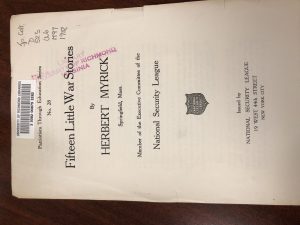
When I came upon “Fifteen Little War Stories” by the National Security League, I was shocked that the fifteen stories could fit in the one page folded pamphlet. When I opened the pamphlet, I understood immediately why they were called “little” war stories, since they were only about two to three sentences each. However, while these stories may be little in length, they are absolutely not small in gesture.
When I saw the phrase “war stories,” I immediately assumed they would be stories of and from men in combat. Therefore, I was surprised to find that they were often stories of things people were doing back home. Often, they are stories of immense sacrifice. For example, the sixth story tells of “a poor woman [who] went out washing to earn money with which to buy yarn to knit soldiers’ socks.” This story struck me from the utter lack of self-interest the woman demonstrated when she finally got some extra money but immediately gave it away to help the soldiers. It is her total sacrifice of everything she can possibly give (even though she perhaps shouldn’t) which makes this story so remarkable even in only a single sentence.
Another similar story tells of a boy who shoveled snow from the sidewalk to earn money, and when one woman asked the boy what he would do with the money he earned, he cheerfully replied: “Buy another thrift stamp and help win the war!” These stories of people who have very little money giving their extra earnings away for the sake of the war well demonstrates the notion that mobilization is far from the only way for someone to participate in the war effort.
The pamphlet includes other stories of the sacrifices people make during wartime, from “meatless, wheatless, candyless, tobaccoless, liquorless days” on American turf to “the flower of youth” risking their lives in battle in Europe.
A key feature of this pamphlet is the closing line of each story, which is always “That’s patriotism!” or some variation of the phrase. The fourteenth story tells of how “The United States has no selfish purpose in the victory that must be won – no hope of aggrandizement” (whether that is really true or not). It further claims that the U.S. fights for “righteousness among nations, brotherhood between humans,” following with “That’s patriotism which transcends nationalism!” This was an important theme of the war narrative. While some pro-war propaganda implies that if the U.S. doesn’t enter the war, the war will enter it, arriving on the Atlantic shore as a threat to our nation, our women, and our children, this almost certainly would not have happened. Therefore, many critics could argue that the U.S. had no place in the European war since it did not concern them. However, here is presented the counterargument that it doesn’t matter whether the U.S. is really being threatened, someone is being threatened and so they must help. In this sense, the duty to come to aid and arms still uses the vehicle of patriotism to carry itself – men sign up for the AEF specifically and the aid in extra goods from home comes from its perceived connection to OUR boys (no longer just THEIR boys). However, these acts of sacrifice are not solely (or sometimes even mostly) for the sake of the United States or American people since the sacrifices fuel the American participation in the war, which fights for others over itself.
And THAT is patriotism!

What a cool find! Imagine taking each tiny story and building it into a short film! The only thing I’m surprised about in your write up is that you don’t deal more with the obvious didacticism of the stories. Each little story is more than just a story, right? It’s a moral parable designed to motivate. It’s interesting to think about how each story achieves that motivational goal — what is the reader supposed to feel and then do?